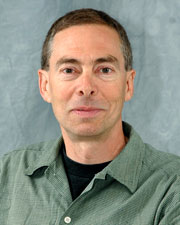Fall 2010
In the Fall 2010 issue:
From the Chair
 The Department of Computer Science, a top-ten ranked computer science department, experienced a 17% increase in enrollment this year (up from 5% increases in the past few years). This swell brings the enrollment to 1,113 undergraduates for 2010-2011. While CS enrollments across the country are remaining level, or decreasing, this increase is a positive sign that UTCS is on an upward trend.
The Department of Computer Science, a top-ten ranked computer science department, experienced a 17% increase in enrollment this year (up from 5% increases in the past few years). This swell brings the enrollment to 1,113 undergraduates for 2010-2011. While CS enrollments across the country are remaining level, or decreasing, this increase is a positive sign that UTCS is on an upward trend.
Many innovative UTCS outreach and recruiting initiatives have contributed to this uptick, including:
- Students outside the major can take a set of Elements classes, which is a certificate program geared toward non-CS students. Faculty teaching these classes actively recruit students who are performing well to consider studying computer science.
- The department created a CS Ambassador program. Undergraduate students set up visits and give tours to prospective students and their families.
- The department received a four year grant from the National Science Foundation to provide scholarships to incoming freshmen. These scholarships are valuable in recruiting the best students. Faculty members contact students personally to offer the scholarships and answer questions about the department.
- The department invites all high school seniors who have been accepted to UTCS to "Explore CS", an annual event where students attend a presentation about the department, tour research labs, and lunch with current students, advisors and faculty.
- UTCS hosts an annual, regional UIL tournament for computer science. Over 100 high school students attended last year and many seriously consider majoring in computer science.
- First Bytes Camp - Every summer, the department hosts 60 high school female students for a free week-long computer science camp. Students who apply to UTCS and are accepted and enroll receive a $1,000 First Bytes scholarship.
- Breakfast Bytes - A monthly Saturday morning event, Breakfast Bytes is a computer science program for middle school and high school students and their parents. A professor gives a talk, followed by interactive activities and bagels.
- Road Show - A dedicated group of undergraduate and graduate students take a computer science presentation to middle school and high school classrooms. They explain what computer science is, they show examples of cutting edge research and they demo a soccer-playing robot dog.
The department continues to explore ways to recruit the best and brightest to a major and a career in computer science. According to a February 2010 article in Network World, choosing a computer science career is a very smart choice indeed!
http://www.cs.utexas.edu/oea/press_desk/utcs_spotlights/2010/want_a_job/
Bruce Porter, UTCS Chair
Capital Campaign Update
In June, UTCS moved out of Taylor Hall, and into temporary offices around campus. UTCS faculty and staff will be officing in ACES, PAI, CSA, UTA, MAI and ENS until the Bill & Melinda Gates Computer Science Complex and Dell Computer Science Hall are complete in 2012.
The Bill & Melinda Gates Computer Science Complex and Dell Computer Science Hall will almost double the capacity of the department. The state-of-the-art complex, which will be located in the space formerly occupied by Taylor Hall, will cost $120 million. The Bill & Melinda Gates Foundation and the Michael & Susan Dell Foundation have generously gifted a total of $40 million in challenge grants, and $57 million has been provided by UT. UTCS is seeking to raise an additional $23 million to complete the project. To learn more, contact chair@cs.utexas.edu.
On October 29th, UTCS celebrated the groundbreaking of the new Bill & Melinda Gates Computer Science Complex and Dell Computer Science Hall with the DigCS Street Fair and Groundbreaking Ceremony .
Check out the live webcams of the Gates Complex/Dell Hall construction!
Research Corner: Opportunistic Wireless Communication
 Opportunistic wireless communication leverages communication opportunities arising by chance to provide significant performance benefit and even enable communication where it would be impossible otherwise. For example, vehicular networks have emerged from the strong need of increased road safety and communication on the move. Communication in vehicular networks happens opportunistically when a vehicle meets an access point (AP) on the road. Such contacts are unplanned and last for only a few seconds. Communication through such opportunistic contacts is often the only means to communicate. Even for static wireless networks, due to probabilistic nature of wireless link losses, we do not know in advance which transmission can get through and opportunistic communication can significantly boost performance over traditional communication.
Opportunistic wireless communication leverages communication opportunities arising by chance to provide significant performance benefit and even enable communication where it would be impossible otherwise. For example, vehicular networks have emerged from the strong need of increased road safety and communication on the move. Communication in vehicular networks happens opportunistically when a vehicle meets an access point (AP) on the road. Such contacts are unplanned and last for only a few seconds. Communication through such opportunistic contacts is often the only means to communicate. Even for static wireless networks, due to probabilistic nature of wireless link losses, we do not know in advance which transmission can get through and opportunistic communication can significantly boost performance over traditional communication.
The large potential benefit of opportunistic communication has attracted significant work in this area. Despite much research, how to systematically optimize opportunistic communication to achieve good predictable performance remains an open issue. A key challenge is how to achieve predictability despite the dynamic and incidental nature of such communication opportunities. Complicated wireless interference patterns, high mobility, and frequent fluctuations in wireless medium further exacerbate this problem.
Professor Qiu's group has developed novel techniques to optimize opportunistic communication in wireless mesh and vehicular networks. In wireless mesh networks, they developed a new wireless network model, and designed techniques to estimate the core parameters in the model. They then proposed algorithms to optimize opportunistic communication for a specified performance objective. A unique feature of their approach is that the performance optimized by their approach is achievable in real wireless networks.
In vehicular networks, they developed Vehicular Content Distribution (VCD), a novel system for enabling high-bandwidth content distribution in vehicular networks. In VCD, a vehicle opportunistically communicates with nearby access points (APs) to download the content of interest. To fully take advantage of such transient contact with APs, they proactively pushed content to the APs that the vehicles will likely visit in the near future. In this way, vehicles can enjoy the full wireless capacity instead of being bottlenecked by the Internet connectivity, which is either slow or even unavailable. They developed a new algorithm for predicting the APs that will soon be visited by the vehicles. Then they designed a novel replication scheme that leverages the synergy among (i) Internet connectivity (which is persistent but has limited coverage and low bandwidth), (ii) local wireless connectivity (which has high bandwidth but transient duration), (iii) vehicular relay connectivity (which has high bandwidth but high delay), and (iv) mesh connectivity among APs (which has high bandwidth but low coverage). They demonstrated the effectiveness of their system using trace-driven simulation and Emulab emulation based on real taxi traces. They also deployed their system in two vehicular networks on UT campus: one using 802.11b and the other using 802.11n, to demonstrate its effectiveness.
Moving forward, motivated by the anticipated opening up of white space by the FCC for unlicensed use and the national plan of opening up more spectrum in the future, Professor Qiu is currently exploring opportunistic spectrum access. She plans to develop techniques to quickly and accurately identify the unused spectrum and enable dynamic spectrum sharing both within a network and across multiple networks, which may speak different network protocols.
by Lili Qiu, Associate Professor, Wireless Networking and Communications Group
Academic Outreach and Initiatives
 UTCS hosted two successful outreach camps this summer. Sixty high school girls attended the 8th annual First Bytes Camp. The girls spent a week on campus making a 3-D graphical movie trailer using the Alice programming language, and they debuted their videos at an Oscar Party on Friday night. They took field trips to Zebra Imaging, the Texas Advanced Computing Center and the Imaging Research Center, they heard lectures from UTCS faculty and they worked on interactive activities with our sponsors: Amazon.com, Cisco, Google and Lockheed Martin. Additional sponsors included the Texas Film Commission and the Texas Workforce Commission. One of the campers said, "First Bytes was a radical experience. Meeting so many successful women in the field of technology was amazing, but my favorite part of camp was connecting with other girls that share my love for computer science!"
UTCS hosted two successful outreach camps this summer. Sixty high school girls attended the 8th annual First Bytes Camp. The girls spent a week on campus making a 3-D graphical movie trailer using the Alice programming language, and they debuted their videos at an Oscar Party on Friday night. They took field trips to Zebra Imaging, the Texas Advanced Computing Center and the Imaging Research Center, they heard lectures from UTCS faculty and they worked on interactive activities with our sponsors: Amazon.com, Cisco, Google and Lockheed Martin. Additional sponsors included the Texas Film Commission and the Texas Workforce Commission. One of the campers said, "First Bytes was a radical experience. Meeting so many successful women in the field of technology was amazing, but my favorite part of camp was connecting with other girls that share my love for computer science!"
Thirty-five computer science high school teachers attended the 4th annual First Bytes Camp for High School Teachers. They learned about cutting-edge computer science, exchanged ideas and discussed curriculum. Google sponsored the camp, and was involved in the planning of the camp.
Thanks to these generous sponsors, both camps were offered to the participants at no charge.
INFOSEC Certification
If you are interested in a career in information assurance, obtaining Information Systems Security (INFOSEC) certification with the Department of Computer Science is a great way to start. The UTCS INFOSEC Certification Program meets standards as set by the National Security Agency and provides students with real-world skills as Information Security Professionals and System Certifiers.
INFOSEC Professionals are responsible for the security oversight or management of national security systems during all phases of the life cycle. System Certifiers perform comprehensive, multidiscipline assessments of an information system’s technical and non-technical security features. They also identify the assurance levels achieved in meeting all applicable security policies and requirements.
To achieve INFOSEC Professional certification, an individual must complete all six of the following 3-hour courses with a grade of C- or better: CS 352 Computer Architecture, CS 356 Computer Networks, CS 361 Introduction to Computer Security, CS 372 Introduction to Operating Systems, CS 378 Network Security and Privacy, and CS 378 Information Assurance and Security. System Certifier certification is contingent upon completion of the INFOSEC Professional Program described above and an additional 3-hour course: CS 378 Computer Security/Auditing Certification.
The INFOSEC Certification Program is a UTCS program in high demand, allowing students who complete it to ensure current and future employers of their computational knowledge. While the Department of Computer Science cannot guarantee that it will offer the full range of INFOSEC courses every year, UTCS plans to hold all courses required for INFOSEC certification in the current 2010-2011 academic year. Students who have completed the INFOSEC Program can apply for certification through the UTCS Undergraduate Advising Office in PAI 5.60.
Visit the UTCS INFOSEC Program page for more information on INFOSEC certification.
UTCS Events
Upcoming Events:
Recent Major Department Events:
- FoCS Career Brunch
- The Edsger W. Dijkstra Lecture Series
- Bill & Melinda Gates Computer Science Complex Groundbreaking
- Visions of Computing Lecture
FoCS
UTCS welcomes new Friends HostGator, LibreDigital, Valero, Yelp and Zynga.
The Friends of Computer Science (FoCS) program connects industry, government and UTCS for mutual benefit in the areas of research, collaborations, outreach and recruiting. Our longstanding members have made much of the department’s progress possible so we gratefully thank our loyal members for their support and interest in our endeavors.
FoCS members recently attended the 2010 FoCS Career Brunch, which was held in conjunction with the College of Natural Sciences (CNS) Career Expo on September 20, 2010 at the Frank Erwin Center. Both students and FoCS members described it as an extremely worthwhile event. Several FoCS members said it was exactly the type of event they needed for their recruitment efforts and some said it was their favorite recruiting event of the year.
For more information, please contact Nancy P. Hatchett at 512.471.9793 or nph@cs.utexas.edu.
Alumni Reconnect: Joseph Sirosh (Ph.D. 1995)
 Joseph Sirosh received a Ph.D. degree in Computer Sciences from The University of Texas at Austin in 1995, working with Dr. Risto Miikkulainen on Computational Models of the Cortex. His primary interests are in neural networks, computational neuroscience, business intelligence systems, and applications of large scale machine learning algorithms to commercial problems on the internet.
Joseph Sirosh received a Ph.D. degree in Computer Sciences from The University of Texas at Austin in 1995, working with Dr. Risto Miikkulainen on Computational Models of the Cortex. His primary interests are in neural networks, computational neuroscience, business intelligence systems, and applications of large scale machine learning algorithms to commercial problems on the internet.
In 1995, Joseph joined HNC Software Inc. (in San Diego), which had hit a home run with neural network based credit card fraud detection systems. After working as a scientist working on novel credit card fraud detection systems using neural networks for international banks, he joined the HNC’s Advanced Technology R&D group and shifted attention to machine learning algorithms for intelligent text search. The Defense Advanced Research Projects Agency (DARPA) and intelligence agencies funded a number of his research projects at HNC, on cutting edge topics such as image and multimedia content search, bioinformatics using machine learning techniques, and intelligent agents.
As Vice President of R&D for HNC Software Inc., Joseph had the opportunity to work on a broad variety of government and customer funded research projects. Post 9/11/2001, Joseph helped put together a team of companies to innovate on airline travel screening techniques using machine learning. After a proof of concept effort funded by Homeland Security, portions of this work were adopted by the government in its efforts to develop next generation security screening software. The IRS was also interested in machine learning classifiers to assist in their efforts to detect tax evasion by corporations. Also, financial services companies found text mining useful for analyzing collections notes and customer communications. Machine learning algorithms were also of interest to retailers looking at personalizing stores using customer purchase behavior.
In December 2004, Joseph joined Amazon.com as Vice President for Transaction Risk Management, to help innovate systems to keep Amazon.com the safest and most trusted place to shop online. From 2007-2010 he also managed Amazon’s Business Intelligence platform, which aggregates and warehouses all of Amazon’s core data and makes it available for retailing applications and business analyses of various types. At Amazon, he helped architect high throughput real-time machine learning systems for trust and safety of orders, third party seller listings, Amazon payments and cloud computing. These systems help ensure the trust and safety of transactions for Amazon in seven countries - US, Canada, UK, Germany, France, Japan and China, helping Amazon in its vision to be earth's most customer centric company and to build a place where people can come to find and discover anything they might want to buy online.
Joseph and his wife, Deepa, have lived in Seattle for the last five years. They have an eleven year old son, Rohit, and a nine year old daughter, Tara.
Faculty News
 We invite you to view our faculty awards, honors and books:
We invite you to view our faculty awards, honors and books:
UTCS says farewell to Research Professor Fred Chang and welcomes Research Scientist Sandip Ray.
For more information about our faculty, please see the research page of the UTCS website.
Major Events and Deadlines
Every Wednesday: Faculty Forum Lunch, 12-1 & Grad Tea Time every afternoon (through May 5th)
- December 2010
- 1 (Wed) - Last class day
- 10 (Fri) - Staff Excellence Awards & Holiday Party, 9:30-11 a.m., MAI 212*
- 24-31 - University Holiday
- January 2011
- 18 (Tues) - Classes begin
- 28 (Fri) - TGIF 4-6 p.m.*
- February 2011
- 2 (Wed) - UTCS Scholarship Lunch, 11:15 a.m.-1:30 p.m.*
- 3 (Thurs) - College of Natural Sciences Career Fair & FoCS Info Session, Recreational Sports Center
- 25-26 (Fri - Sat) - GradFest 2011*
- March 2011
- 5 (Sat) - Explore UT! 11 a.m.-4 p.m.
- 14-18 (Mon - Fri) - Spring break
- 25 (Fri) - TGIF 4-6 p.m.*
- April 2011
- 15 (Fri) - College of Natural Sciences Undergraduate Research Forum, Welch*
- 29 (Fri) - TGIF 4-6 p.m.*
- May 2011
- 6 (Fri) - Last class day
Commencement Celebration 2-4 p.m.
* = Invitation only
- 6 (Fri) - Last class day
Press Desk
For more UTCS news, please visit our press desk:
Check out the Newsletter Archives for past newsletters
